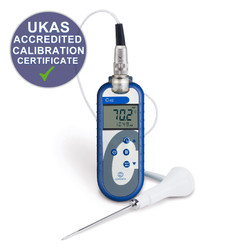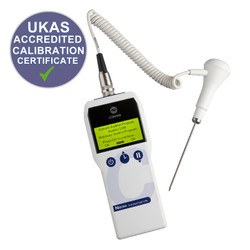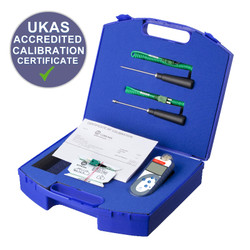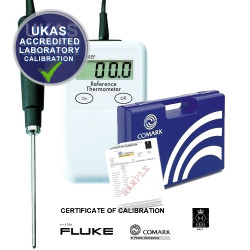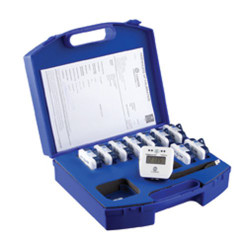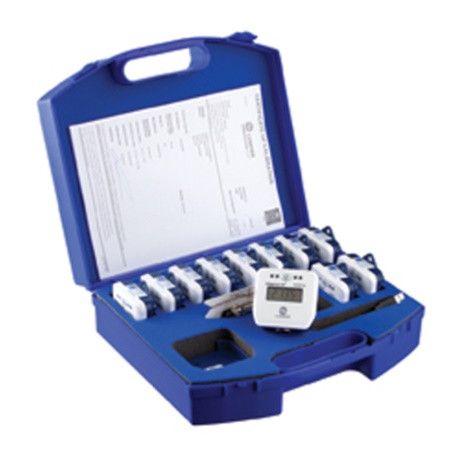 Loading... Please wait...
Loading... Please wait...- Sales Helpline Tel: 01704 227 157 Mon - Fri 8.30am to 1pm / 2pm to 5pm GMT
- My Account
- Home
- FOOD & CATERING
- Fridge Freezer / Pharmacy / Vaccine
- Comark N2000BBKIT1 Blood Bank Mapping Kit With UKAS Certification
Categories
Comark N2000BBKIT1 Blood Bank Mapping Kit With UKAS Certification
Comark Fluke Instruments
Product Description
Comark N2000BBKIT1 Blood Bank Mapping Kit
The N2000BBKIT1 Blood Bank Mapping Kit with N2000 Series Data Loggers. This kit allows you to set up your own temperature mapping kit for a fraction of the cost of outsourcing the capability. The N2000BBKIT1 Blood Bank Mapping Kit includes 11 wireless data loggers, probes and a computer interface module, so you can gather and record your data quickly and easily, maintaining your audit trail for your cold chain.
Ideal for:
- Refrigerators
- Freezers
- Cold Rooms
- Blood Banks
The N2000BBKIT1 Blood Bank Mapping Kit is fully certified by UKAS, and contains:
- 10 x N2011 Multi-Use Temperature Data Loggers
- 10 x UKAS Certificates (-20°C, 0°C, and 8°C)
- 1 x N2014 Multi-Sensor Temperature Data Logger
- 1 x N2000ADP/T Adapter for multiple probes
- 3 x KX9556 Special Probe
- 3 x UKAS Certificates at -40°C and -80°C (for FFP Freezers)
- 1 x N2000CRU Computer Docking Station
- 1 x LC28 Durable Carry Case
 |
The N2011 Multi-Use Temperature Data Logger allows easy monitoring of temperature sensitive systems, in transit or in storage. Complying with EN12830:1999 standard, it is perfectly suited for cold chain applications. |
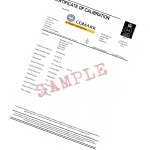 |
UKAS Calibration Certificate at the standard points of -20°C , 0°C and 8°C. |
 |
The N2014 Multi-Sensor Temperature Data Logger allows you to monitor temperature at up to three different points, with a wide variety of probes making it suitable for applications across food, pharmaceuticals and healthcare. |
 |
The N2000ADP\T is an adapter for the N2014 Diligence EV Data Logger. It allows you to connect up to 3 sub-miniature (Type T) probes to your N2014 Data Logger, via a single Lumberg connector. |
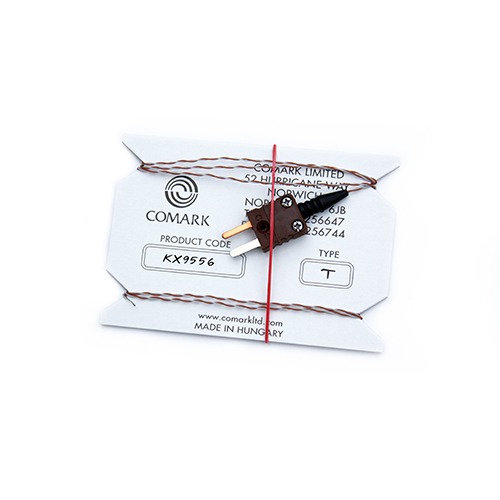 |
The KX9556 Special Probe is a variant of the AT26M Flexible Wire Air Probe, which is fitted with a Type T Thermocouple Sensor, but with a 2m lead instead of the standard 1m length. |
 |
UKAS Calibration Certificate at the points of -40°C and -80°C (for FFP Freezers) |
 |
The N2000CRU Computer Docking Station is designed to work with the N2000 Diligence Series Data Loggers for syncing data between the device and your PC. It connects to your PC via a standard USB A-Type connector, and provides an Infrared (IR) link to Data Loggers placed in the cradle. |
 |
The LC28 Large Case is a hard carrying case specifically designed to hou |
Upgraded EV Software (July 2016)
Comark is pleased to announce that its suite of Software for EVT2 and N2000 Series Data Loggers, has had a major overhaul and upgrade.
The interface has been redesigned and the software upgraded to be fully compliant with Microsoft Windows 10.
The new EV Software can be downloaded from the link to Comark site shown below.
There are two versions available EV Software and EV PRO Software for 21 CFR Applications*.
*Note: If you require the Professional version of the software and have not previously downloaded it from our website, please Contact Comark and we’ll ensure you get the link to download it.
VISIT COMARK WEBSITE FOR SOFTWARE AND UPDATES ON THIS PRODUCT "CLICK HERE" AND SELECT SUPPORT TAB
N.B you must create a Comark Website account to access the software download.
Comark Blood Bank Information
Blood Banks are highly regulated to give peace of mind when it comes to patient safety and the products stored.
To comply with product liability legislation under the Consumer Protection Act (UK) and the Blood Safety and Quality Regulations (UK), red cells must only be stored in designated Blood Bank refrigerators.
Both air and core product temperatures in a blood bank will need to be maintained at specific levels and alarm notification should be sent out immediately if there is any deviation.
In addition to this, only staff trained by the may remove blood from the blood bank issue room refrigerators and blood must not be out of the designated temperature controlled storage areas for more than 30 minutes. That means not collecting blood until a patient has been cannulated ready for transfusion, for example.
Blood is an excellent culture medium for bacterial growth. It is therefore stored in approved blood bank refrigerators at +2 to +6°C (+35.6 to +45.8°F), where it has a shelf life of 35 days from the time of donation. There are legal requirements for temperature regulation and alarm systems when it comes to the storage of blood.
Hospitals have approved blood bank refrigerators located in the blood Issue rooms in pathology and in the store room in theatres.
Blood must never be stored in domestic or other refrigerators. Blood should be removed, one unit at a time, from the blood bank refrigerator only when a transfusion is due to commence within the next 30 minutes. Transfusion must be completed within 4 hours of removing the pack from the blood bank refrigerator to avoid the risk of bacterial growth.
Blood storage facilities are regulated under strict compliance standards, with the safety of patients relying heavily on proper handling and storage of blood from the moment a donation is made, as well as ensuring that wastage is preventable.
Knowing all this and understanding the very tight constraints and controlled nature of blood bank product storage, we know we can help with a automated wireless temperature monitoring system tailored to your needs.


